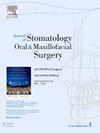The role of postoperative radiation therapy in early-stage tongue carcinoma: A systematic review and meta-analysis
IF 2
3区 医学
Q2 DENTISTRY, ORAL SURGERY & MEDICINE
Journal of Stomatology Oral and Maxillofacial Surgery
Pub Date : 2024-12-12
DOI:10.1016/j.jormas.2024.102192
引用次数: 0
Abstract
Although the overall prognosis for early-stage oral tongue squamous cell carcinoma is good, a significant portion of patients still experience locoregional recurrence and affect the disease-specific survival. At present, whether more aggressive postoperative radiation therapy in this particular patient population should be taken is still controversial. The analysis exhibited that disease-free survival (OR = 0.53, 95 % CI:0.35–0.81; P = 0.003) and locoregional recurrence-free survival (OR = 0.59, 95 % CI:0.38–0.93; P = 0.022) was significant improved in patients received radiotherapy compared to surgery alone. However, radiotherapy failed to improve overall survival (HR = 1.06 95 % CI:0.42–2.64, P = 0.901). Furthermore, two studies reported overall survival based on depth of invasion as well. The pooled OR was 1.65 (95 % CI:0.31–8.91, P = 0.221) and no survival benefit was observed for early-stage patients underwent adjuvant radiotherapy according to depth of invasion. Current evidence is insufficient to independently support the depth of invasion as an effective indication for radiotherapy of early tongue cancer.
早期舌癌术后放射治疗的作用。系统回顾和荟萃分析。
虽然早期口腔舌鳞状细胞癌的总体预后良好,但仍有相当一部分患者会出现局部复发,影响疾病的特异性生存。目前,对这一特殊患者群体是否应采取更积极的术后放疗仍存在争议。分析显示,与单纯手术相比,接受放疗的患者无病生存率(OR=0.53,95% CI:0.35-0.81;P=0.003)和无局部复发生存率(OR=0.59,95% CI:0.38-0.93;P=0.022)显著提高。然而,放疗未能改善总生存率(HR=1.06 95% CI:0.42-2.64,P=0.901)。此外,有两项研究还报告了基于浸润深度的总生存率。汇总的OR值为1.65(95% CI:0.31-8.91,P=0.221),根据侵犯深度进行辅助放疗的早期患者未观察到生存获益。目前的证据不足以独立支持将浸润深度作为早期舌癌放疗的有效指征。
本文章由计算机程序翻译,如有差异,请以英文原文为准。
求助全文
约1分钟内获得全文
求助全文
来源期刊

Journal of Stomatology Oral and Maxillofacial Surgery
Surgery, Dentistry, Oral Surgery and Medicine, Otorhinolaryngology and Facial Plastic Surgery
CiteScore
2.30
自引率
9.10%
发文量
0
审稿时长
23 days
 求助内容:
求助内容: 应助结果提醒方式:
应助结果提醒方式:


